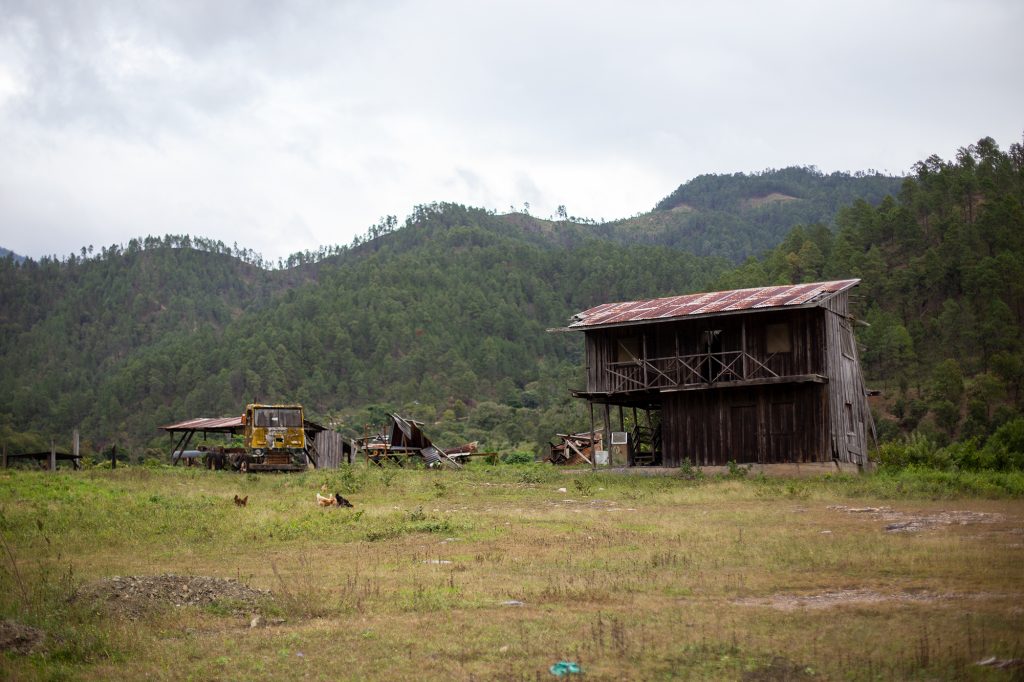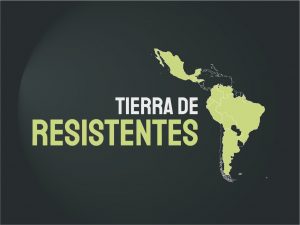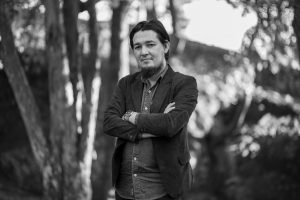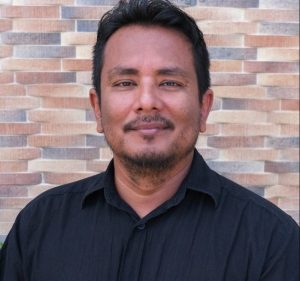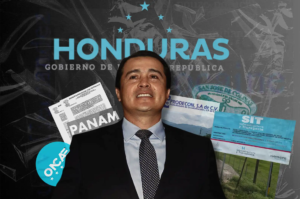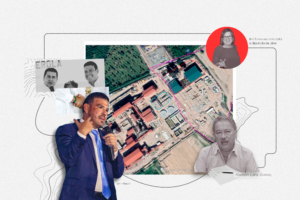The Tolupan San Francisco de Locomapa Tribe, in Yoro, Honduras, has suffered murders, judicial harassment and attacks due to its opposition to the power generation projects in the territory where they have always lived, but which is now in dispute. In the past 20 years, 40 Tolupan indigenes were murdered, a population that faces its own extermination.
This article is part of an international especial Tierra de Resistentes, coordinated by Consejo de Redacción.
Consuelo Soto speaks always looking at the other side of the street, as if expecting another attack from the members of her community who have harassed her for years. A couple of weeks ago, she was threatened again. She answers questions almost whispering, in front of her house, which preserves the memory of the violence perpetrated against the tribe.
Consuelo is one of the Tolupan leaders facing threats and attacks for defending the Tolupan territory of San Francisco de Locomapa in the Yoro department, North Honduras. The conflict within the tribe was triggered in 2009 when two companies, Venta Local de Madera y Transformación Ocotillo (Velomato) and Industria Maderera Rene Eleazar (Inmare,) along with the National Institute for the Preservation and Development of Forests, Protected Areas and Wildlife (ICF, in Spanish,) developed forest management plans giving rise to the sale of wood extracted from forests located within Tolupan territory.
In San Francisco de Locomapa, there is a division based on different visions on territorial management. Although the Tolupan manage themselves through a hierarchical structure with a cacique, who provides advice in the decision-making process, and a Tribal Council responsible for taking them, not everybody in Locomapa agrees with these council’s decisions.
On the one hand, there is the Tribal Council and 800 people out of the tribe’s total of 3,000 who agree on giving permission for chainsaws to extract and sell wood. On the other hand, the remainder of the tribe rejects that possibility or are afraid of expressing their opinions. In order to face the other side, they decided to create a parallel entity called the Preventive Council of Tribes.
The Tribal Council chairman, José Alberto Vieda, affirms that the forest is “renewable” and that most of the tribe members are making the decision on the sale. The 40-year-old man said he sold 14,800 mts of wood at 250 lempiras ($10) each to Honduran businessman Wilder Domínguez. He subsequently affirms the profit was distributed in the meeting. The community pays 15% over the sale to the Federation of Xicaque Tribes of Yoro (Fetrixy, in Spanish,) an organization gathering all Tolupan tribes of the country, and an additional amount of 40 lempiras ($1.62) per cubic meter for municipal taxes, according to an investigation conducted by the Study Center for Democracy (Cespad, in Spanish.)
This potentially accounts for an approximate of 2.5 million lempiras (around $100.000) for the community. The approximate 800 persons agreeing with the cutting down receive 500 lempiras ($20) for each 5.000 meters of wood approved in meetings, according to the information published on the Tribal Council’s Facebook page.
93.9% of the Tolupan hardly cover the expenses of the basic food basket, living below the extreme poverty line according to a report by the UN Special Rapporteur on the rights of indigenous peoples. “They also face discrimination, which makes them vulnerable to unfair and precarious working conditions,” Special Rapporteur Victoria Tauli-Corpuz said.
Their precarious situation is notable in a country ranked 132nd out of 189 countries in the Human Development Report prepared by the United Nations Development Programme – UNDP and where, according to other organizations, over half the country (67.4%) lives in poverty.
As almost all indigenous peoples in the country, the San Francisco de Locomapa tribe’s conditions are precarious. However, the State’s oblivion is much more evident for the Tolupan people: there are no paved streets, no public lighting, no cell phone reception in nearly the entire community and many of them must walk for hours to receive healthcare services.
To contact Consuelo, you have to wait for her to pay 10 lempiras ($0.45) to charge her cell phone. When working, she places the cell phone on buckets close to the roof, as she claims reception is allegedly better sometimes.
Historically, the Tolupan have devoted themselves to agriculture, producing mainly corn, beans and coffee to subsist. This was how they built a close relationship with nature and developed a sense of responsibility and care about the treatment natural assets must receive.
A car for mountain terrain is required to reach the Tolupan territory. Within the best Honduran Pine forests and a land rich in minerals such as iron oxide, silver and antimony, over 40 murders have occurred in indigenous communities in the last 20 years, according to a report submitted by the Working Group on Mining and Human Rights in Latin America before the Inter-American Commission on Human Rights (IACHR.)
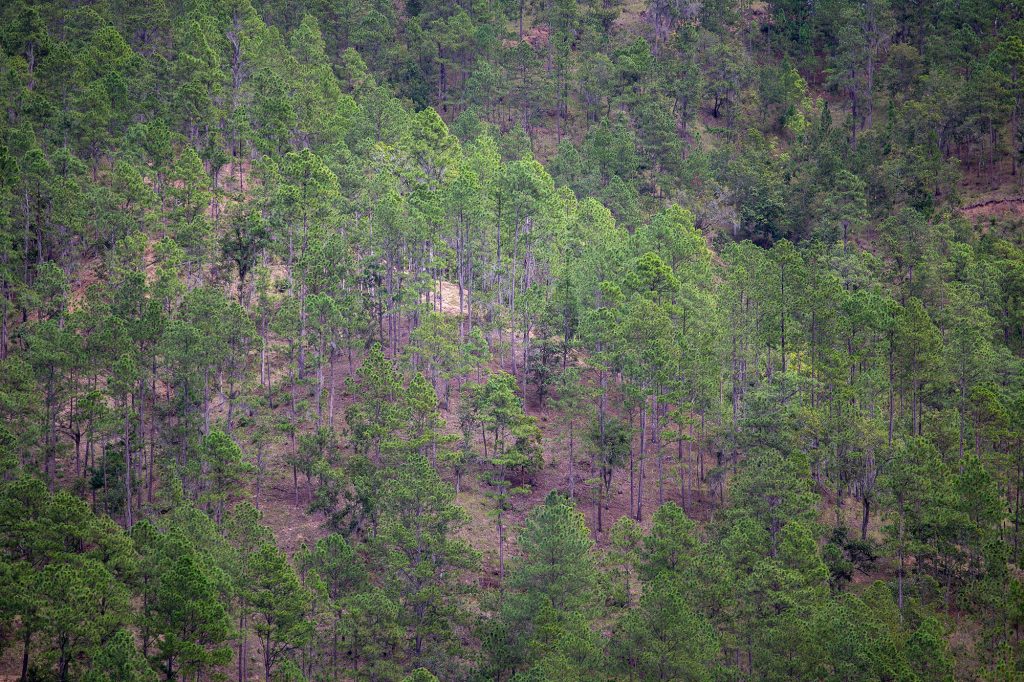
In San Francisco de Locomapa, murders linked to the mining conflict started in 2013. From that moment, the Broad Movement for Dignity and Justice (MADJ, in Spanish) has recorded 10 murders not only linked to the wood conflict but also to an antimony mine. The name of the deceased are María Enriqueta Matute, Armando Funez, Ricardo Soto, Luis de los Reyes Marcía, Eracimo Vieda, Santos Matute, Fermín Romero, Juan Samael Matute Ávila, José Salomón Matute and Milgen Idan Soto Ávila. The last three were murdered in 2019.
One of the murder victims was Consuelo’s partner -Luis de los Reyes Marcía-, murdered in 2015 when returning to San Francisco de Locomapa upon living away from the community for six months due to threats made by persons supporting the mining activity and the sale of wood in the community.
Consuelo was forced to run away a second time. She came back one month later, but someone was waiting to kill her in her own house.
“Again, I had to run away immediately, I don’t even want to remember,” Consuelo says. “My daughters tell me not to report, to wait until things calm down and that divine justice exists. But that’s what human laws are for, to punish people who commit these crimes. But the law is useless because, if they (the police) were doing anything, they would have captured all the people who commit the crimes.”
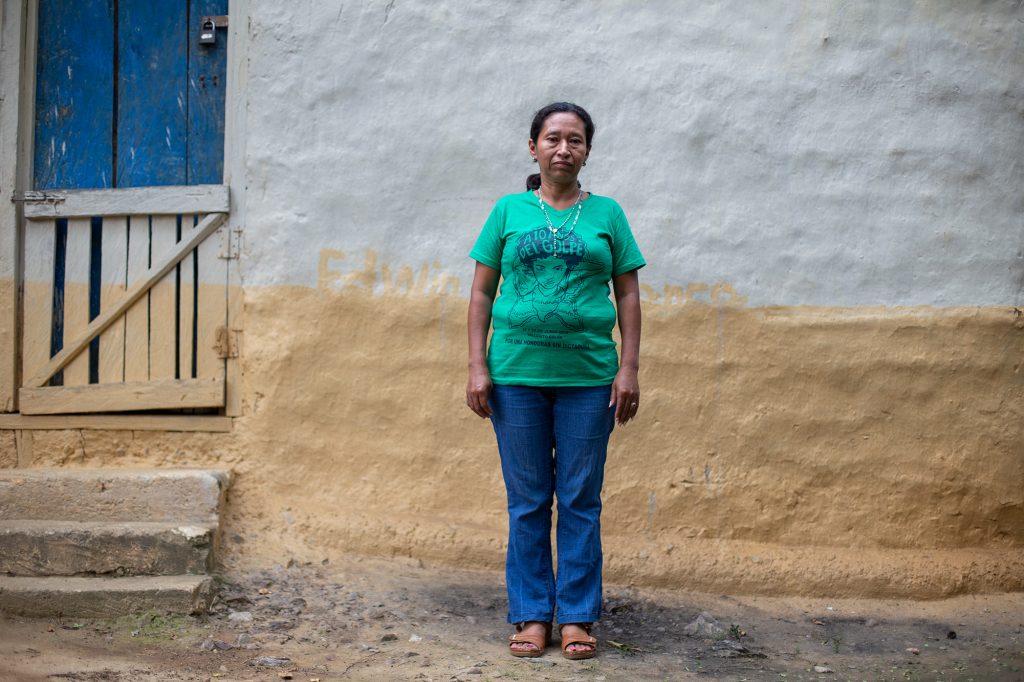
In the middle of February 2020, the Public Prosecutor’s Office captured Fredy Antonio Matute Soto, one of the alleged murderers of Reyes Macías. In the official statement, the public office affirms that “the prisoner, along with other gang members, have been responsible for several murders of Tolupan indigenes,” although the details of the crime’s exact motive remain unknown. As a result of this capture, Consuelo has received new threats.
Reyes Marcía and Consuelo are part of a group of 38 people who were granted precautionary measures by the OAS Inter-American Commission on Human Rights (IACHR) on December 19, 2013 following the killing of three other indigenous tribesmen during a protest.
Contra Corriente contacted Jany del Cid, head of special prosecutors for Ethnic Groups and Cultural Heritage of the Public Prosecutor’s Office, responsible for investigating these incidents, who replied she is not authorized to give interviews. The office’s communications division confirmed to have requested the information to provide an interview on the investigation progress, but no further reply was received.
Some days after the murder of Jose and Juan Matute, the OAS Inter-American Commission on Human Rights (IACHR) urged Honduras to investigate their violent deaths and stressed the need to include “investigation lines that assess the hypothesis that the crime may have been motivated by their activities as human rights defenders.” The IACHR also reported to have no further information about the compliance with the precautionary measures the Honduran State had to implement for their protection.
Conflict with the Wood Industry
“A woodcut is demonized in the sense that it is performed according to an ICF-approved management plan, passing all the technical regulations, which I don’t know much about because I’m not an engineer. Fetrixy can’t refuse to give the go-ahead because they decide so. We explain to our people that social projects are required for any sales to be made,” said Noé Rodríguez, coordinator of Fetrixy -an organization allegedly devoted to the recovery of territories-.
When several members of the community became aware of woodcuts, they started to gather in order to protest against it and the Tribal Council called for a meeting where they were not allowed to speak, Consuelo explains. “The next day, they showed up to say that we shouldn’t be there and that the sales were already approved by the meeting, and that the meeting was called for that reason: the approval, because the antimony mining and the wood sale had already been approved. But that’s a lie, because opinions at the meeting were divided,” Consuelo added.
Like other Honduran native peoples, the Tolupan people live in a constant fight for the protection of their territory. This defense is protected by the International Labor Organization (ILO) C169 – Indigenous and Tribal Peoples Convention, which was signed by Honduras. This international convention protects the indigenous peoples’ right not to be displaced and to carry out projects in the territories “only with their free, prior and informed consent.”
One of the bills the National Congress (NC) is currently preparing is the Free, Prior and Informed Consultation Law. Upon its public announcement in January 2020, native peoples’ organizations protested in front of the NC to declare their opposition to the bill. Their observations include the fact that the law does not meet international standards as it does not come to an understanding with all indigenous peoples and addresses the consultation homogeneously, without respecting each people’s differences.
This lack of consultation with local communities takes place in a tense environment within Honduras. Different extractive projects have caused many conflicts and violent incidents against leaders and members of communities opposing to mining, hydropower, wood and tourism projects, where the State has not been able to clarify the circumstances or identify the responsible parties.
The murder of Berta Cáceres, a recognized indigenous leader and founder of the Civic Council of Popular and Indigenous Organizations of Honduras (COPINH, in Spanish,) made the violent reality faced by environmental defenders public. However, many more deaths have occurred in Honduras for this reason.
From 2010 to 2017, 120 environmental leaders were killed according to the Global Witness report, a British NGO monitoring this issue around the world. This figure places Honduras as the most dangerous place for environmental activism worldwide.
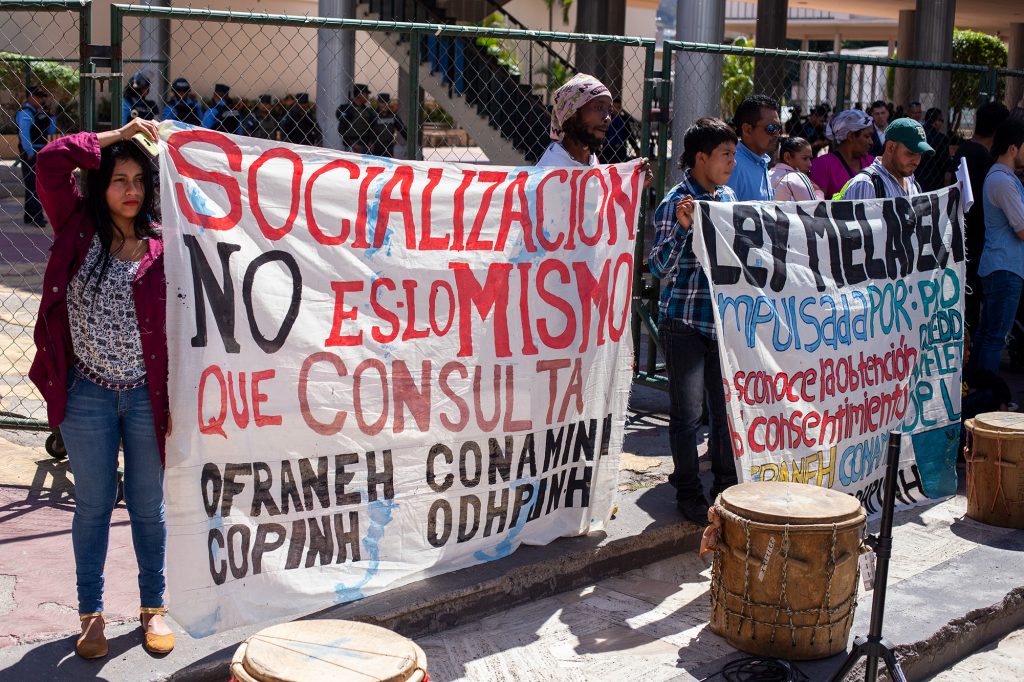
Berta Zúniga, current COPINH coordinator and Berta Cáceres’s daughter, is concerned about the economic extractive model promoted by the government. “The main obstacle is the indigenous peoples that have defended those territories from national and international companies with their lives, with their bodies, with their community fights,” she says. In addition, misery among indigenous communities has increased in order to toy with people’s basic needs and promise social projects in exchange of passing this kind of laws, she denounces.
This kind of dynamics takes place in San Francisco de Locomapa, where wood companies have offered people support and promised to implement social programs to improve the community’s situation.
In 2001, there were 9,617 Tolupans in Yoro and Francisco Morazán (two Honduran departments linked by mountains) according to a National Statistics Institute’s census. Anne Chapman, a French American anthropologist who studied the Tolupan and Lencan peoples in Honduras, estimates that the former has existed for approximately 5,000 years. On its part, Global Witness says that “The Tolupan are the most marginalized indigenous group in Honduras, living in extreme poverty in remote rural areas with little access to basic services.”
Wood companies lumbering forests without the entire community’s consent take advantage of the whole situation.
Inmare, a sawmill owned by Wilder Domínguez, operates through “the direct purchase of rolled wood products coming from different places approved by the ICF,” according to an audit conducted by the ICF in 2018. One of them is San Francisco de Locomapa.
The region also sees the operation of the Velomato sawmill, owned by Honduran businessman Kenton Landa Uclés and located in the Las Tejeras village, Yoro municipality. The wood is used by the company Inversiones del Atlántico (Invertlan), which is also part of Grupo Landa, a company group created by its executive director, Landa Uclés.
ICF audits show that both sawmills have wood supplies superior to those reported in their monthly reports. It is also noted that sawed wood sales are higher than the volume produced with wood supplies, which indicates that the industry sold or delivered more wood coming from the mountain chain.
Both businessmen have links through Inversiones del Atlántico (Invertlan,) as evidenced in the Corporate Registry of the Cortés Chamber of Commerce and Industry. Kenton Landa Uclés is a partner with 60% of shares, while Wilder Domínguez owns 40% of shares and is the company’s general manager.
Invertlan and Grupo Landa claim to be devoted to provide treated and untreated wood for power transmission lines, and are providers of state-owned and private companies operating for the distribution and management of the country’s energy.
It is not clear yet where wood cut by Inmare ends. Public records do not explain it and the Yoro ICF does not respond regarding the wood’s destination either. Likewise, Invertlan and Grupo Landa share the same phone number. Contra Corriente attempted to contact both companies, with no response. E-mails sent to their public contact information were also unanswered.
“If we decide to process wood on our own, we’d see what part affects us and what part doesn’t. The company doesn’t see that, and they don’t care. They use their capital because the income resulting from this forest means they can live in Miami or anywhere else while we get screwed,” says Celso Cabrera Matute, who is part of the rival Preventive Council of Tribes and is currently prosecuted for defending his territory.
Celso walked several minutes from the mountain behind his house. His hands and clothes are still impregnated with fresh soil after cultivating basic beans. He lives in a little wooden house with earthen floor and a roof with holes which, according to him, were made by stones thrown to threaten him.
“We aren’t afraid of dying or being arrested, but I do have to tell you that I feel bad because I lost my Nana (mother) and the authorities have not made changes. Instead, they are still prosecuting us,” he added.
Judicial Proceedings against the Tolupan
In March 2010, Kenton Landa Uclés filed a claim against José María Pineda, Tomás Matute, Melvin Castro, Carlos Martínez, Bernardo Martínez, Celso Cabrera Matute, Juan Matute and Armando Fúnez Medina, as evidenced in Yoro court file 36-2010.
He accused them of hindering the execution of the forest management plan approved by the National Institute for Preservation and Development of Forests, Protected Areas and Wildlife (ICF) to the prejudice of his company, Velomato.
The proceeding took three years and after a decision of the Court of Appeals of San Pedro Sula in 2013, the case against the Tolupan was dismissed with prejudice.
“The indigenous protest cannot be considered an illegal action, as this was legitimized under ILO C169, which protects their right to be consulted ‘before’ starting or authorizing any prospection/production program for resources existing their lands,” the court decision states.
However, the decision was not considered when, in January 2012, Landa Uclés started the second judicial proceeding against two of the same members of the community (José María Pineda y Celso Cabrera Matute) and a new one (Oscar Cabrera Matute). Once again, he accused them of hindering the execution of the forest management plan approved by the ICF, to the prejudice of Velomato, upon demonstrations conducted by the tribe in the site occupied by the company.
In the initial hearing, the judge hearing the case ordered precautionary measures for the indigenous leaders, but they finally were dismissed with prejudice. In a new decision by the Supreme Court of Justice in 2015, the State admitted that the protest could not be deemed illegal as ILO C169 set forth their right to be consulted before exploiting resources in their lands.
An Illegal Mine and a Regular Cry for Justice
In 2013, violence worsened. On August 25, during the occupation of a road against an antimony mine, a group of hitmen murdered three protesting Tolupans: Armando Fúnez Medina (44), Ricardo Soto Fúnez (40) and María Enriqueta Matute (71), mother of the Cabrera Matute brothers.
Celso still lives in the house where his mother was murdered. He points to the ground, close to a wood pole, and comments on Ricardo’s death that: “There, he just put the shotgun on his head, and it didn’t even make a sound.” One of the hitmen asked which community leaders were against the extraction of wood and minerals, he remembers. Armando Fúnez answered there were no leaders and they were defending everyone’s rights. In that moment, the hitman shot and murdered him. His mother was killed because she witnessed everything.
Una mina ilegal y el reclamo constante por justicia
En 2013 arreció la violencia. El 25 de agosto, durante una toma de carretera en contra de una mina de antimonio, un grupo de sicarios asesinó a tres tolupanes que protestaban: Armando Fúnez Medina (44), Ricardo Soto Fúnez (40) y María Enriqueta Matute (71), la madre de los hermanos Cabrera Matute.
Celso aún vive en la casa donde su madre fue asesinada, señala al suelo, cerca de un poste de madera. “Ahí solo le puso la escopeta en la cabeza y ni sonó”, dice sobre la muerte de Ricardo. Uno de los sicarios preguntó quiénes eran los cabecillas de la comunidad en contra de la extracción de madera y minerales, recuerda. Armando Fúnez le respondió que no había cabecillas y que estaban defendiendo los derechos de todos. En ese momento el sicario le disparó a él, causándole la muerte. A su madre la asesinaron por haber presenciado todo.
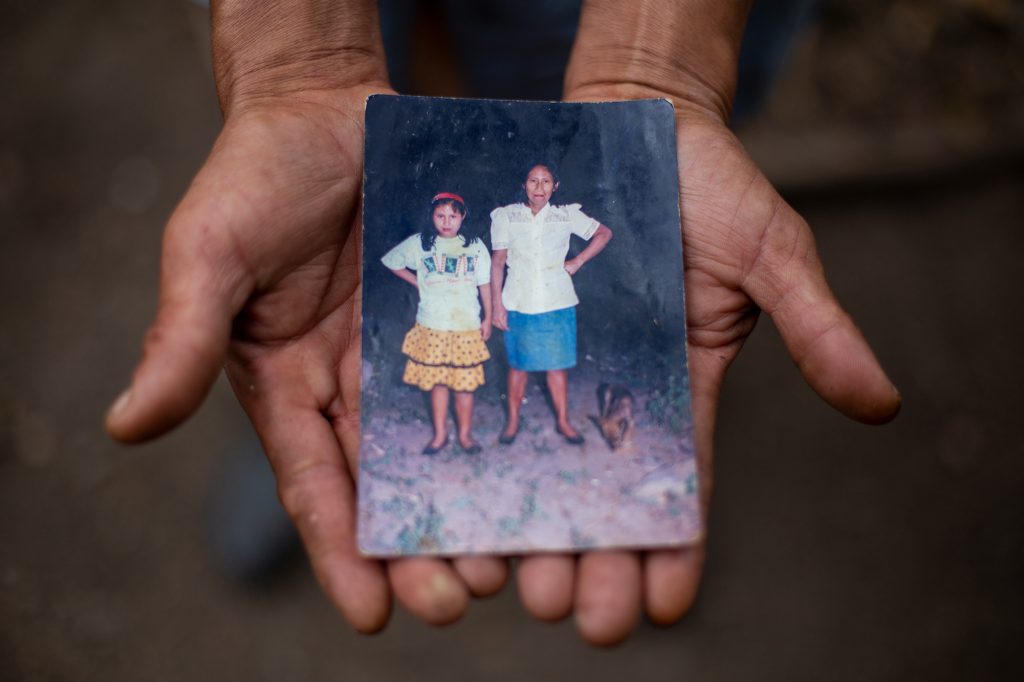
That day, hitmen had come to the place asking for her, Consuelo says. If she had not gone out earlier for some photocopies, her name would be on the murder’s list of victims. Some months earlier, she received threats with sexist messages. “Avoid being on the street. Do you know what you’re doing? You’re gonna be killed, you better stop and go home because you have a lot of work in the kitchen. I don’t know why you’re wasting your time,” she was told one of the times she was asked to talk during the road occupations.
According to community members, the hitmen were linked to Lachansa Co, a mining company devoted to antimony extraction, according to its official information.
Since 2012, the Tolupan saw how the water of the Guayma river, a watershed that passes by San Francisco de Locomapa, started darkening as a result of the contamination of antimony extraction.
Long-term exposure to this mineral – which serves for the alloy with other metals such as lead and to manufacture batteries, arms, cable coats and other industrial products –may cause irritation in eyes, skin, lungs and even stomach ulcers. It is still unknown if it is capable of causing cancer or reproductive failures, according to the U.S. Agency for Toxic Substances and Disease Registry.
The mayor’s office had granted the authorization irregularly, without consulting the communities. For that reason, the Prosecutor’s Office, through special prosecutors for Ethnic Groups prosecuted Medardo Varela Bustillo, Yoro Municipal Environmental Unit Head.
The Prosecutor’s Office confirmed that the company requested the Municipal Environmental Unit for antimony extraction licenses in La Mina and Lagunitas in Yoro (which are part of the San Francisco de Locomapa tribe.) The request was filed by the mayor’s office under No. 432688 and, although the amount is not specified, Varela Bustillo is accused of receiving “a sum of money” for such licenses. All of this happened without the due delimitation usually conducted by the Honduran Geology and Mining Institute (INHGEOMIN in Spanish) in the areas intended to be authorized for mining projects.
Mining is deemed one of the worst environmental threats in Honduras by scientists and social organizations. There are 310 mining licenses granted in the country, 92 of which are for metals, 210 for nonmetals, 1 for handmade mining and 7 are pending, according to the database of the Honduran Community Development Promotion Center (CEHPRODEC, in Spanish). In addition, another 199 licenses are pending approval.
If all requested licenses are approved, 75% of rivers in the country will be impacted, Oxfam International warned. And not only the water would be contaminated, but also the populations downstream the mining operations are exposed to the contaminations of crops. At least, 27% of land used for agriculture in Honduras is located in areas exposed to mining-related contaminants.
“My mother’s death happened because we were on the street defending the environment, the land, the forest, the stones, the sand, the river, everything. Because if we let it go, what are we going to build?” says Celso Cabrera, María Enriqueta’s son.
In 2018, the Prosecutor’s Office through special prosecutors for Ethnic Groups won the case against Carlos Roberto Luque Varela, who was sentenced to 45 years in prison for killing María Enriqueta and another two Tolupans. The official statement reads that the convict “took the machetes from and killed Ricardo Soto Fúnez and Armando Fúnez Medina, and subsequently murdered Mrs. María Enriqueta Matute for witnessing the facts.”
Luque escaped from prison that year along with another seven prisoners through a tunnel, and all of them were subsequently killed by unknown persons.
In 2019, the Police Investigation Division (DPI in Spanish) captured Selín Eliazar Fúnez Bonilla, who was also accused of those three murders and had a warrant for his arrest since 2013. He is currently in prison, awaiting trial. The communities reported that Fúnez Bonilla provided security services to one of the wood companies.
The Prosecutor’s office did not provide official information on the conviction of perpetrators who killed the three Tolupan persons, nor if is there information on the intellectual author. Meanwhile, Maria Enriqueta’s sons do not feel that justice has been served because the captured people are just the perpetrators, not the people who ordered the crimes.
The Tolupan’s Abandonment Situation
Tolupan tribes have historically been displaced. They came to the mountains of Yoro and Francisco Morazán running away from the slavery and violence suffered by native peoples during colonial times. Now, they have been living in these remote forest zones for over a century.
The violence situation and slavery made the Tolupan be “cloistered in the mountain chains and dense tropical forests of the coast, still unreachable for conquerors, looking for isolation and the survival of their own culture and freedom,” according to Jesuit priest José María Tojeira in his book, Los Hicaques de Yoro.
Therefore, in the 19th century, priest Manuel de Jesús Subirana interceded on behalf of the indigenes for the State to recognize and grant ownership over their lands and thus free them from slavery. In this way, several Tolupan tribes were granted ownership: San Francisco de Locomapa has it since 1864, and although it is referred to as “ancient”, this is a legal title granted by the first president of the Republic of Honduras, General José María Medina.
In the ‘80s, Army General Filander Armijo Uclés, currently retired, came to the San Francisco tribe’s territory and started to take over the lands. He came to the area and obtained a supplementary title issued by the National Agricultural Institute (INA in Spanish,) a document used in the absence of an ownership title. This directly affected the territory legally owned by the Tolupan since 1864.
In Locomapa, Filander Uclés is deemed a landlord with connections to the Urbina political clan, who came to municipal power in the ‘90s. One of their leaders is former mayor Arnaldo Urbina, who was requested for extradition by the United States in 2019, accused of conspiracy to introduce cocaine into U.S. territory. He is still in the country because he must answer for the 24 alleged public embezzlement crimes and 87 authority abuse crimes.
Former general Ucles was well connected. In the ‘80s, he was director of the Regional Military Training Center (CREM in Spanish) as part of the National Security Doctrine entered into with United States, according to the informative bulletin issued by the Honduran Documentation Center (CEDOH in Spanish.)
In 2014, he came to the Córdoba Soto’s house and threated them with burning the house and killing them. For this reason, the general was convicted of damages and threats against the indigenous family in January 2019. From the beginning of the court proceeding in 2015, a restraining order was imposed on him to protect the family, which he breached by threatening them one last time in 2015.
Uclés always bore an arm, so at least 11 members of the Córdoba Soto family were displaced and currently just return to the property to clean it from time to time, according to Madrid. The Córdoba Soto are listed as beneficiaries of the precautionary measures issued by the Inter-American Commission on Human Rights (IACHR) in 2013.
Conflicts similar to those over the Tolupan lands take place amongst the 31 tribes distributed in several municipalities of Yoro, North Honduras, and in the Orica and Marale municipalities, in the Francisco Morazán department.
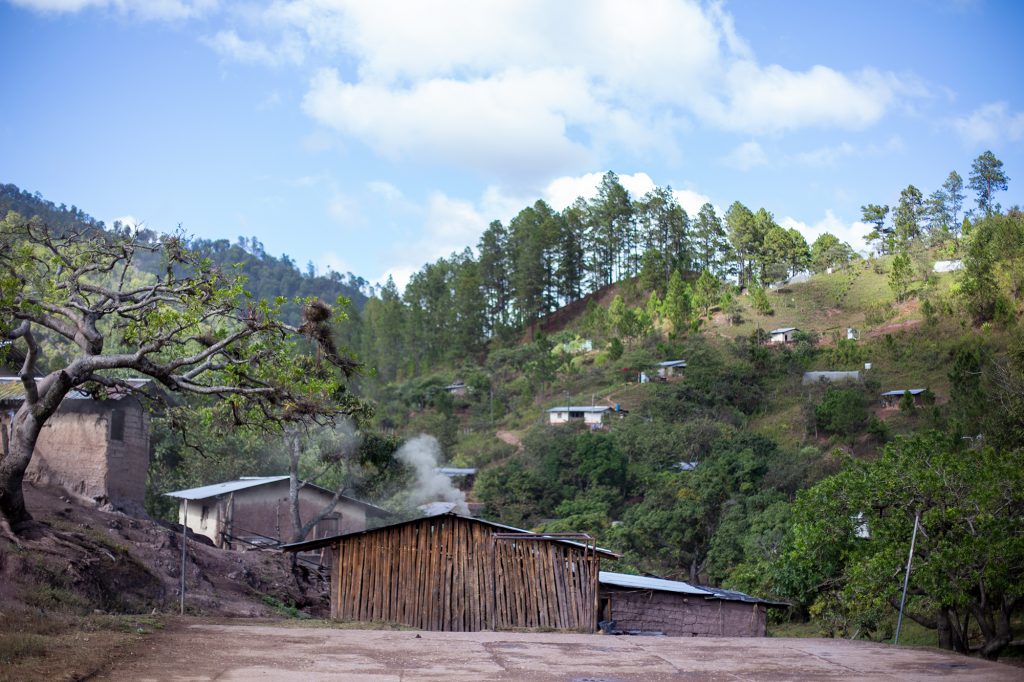
Tribes facing no conflicts against companies seem to be more forgotten, but death is also present in their pine forests. In the Mountain of the Flower, Francisco Morazán department, there are five Tolupan tribes facing problems regarding land ownership. Gertrudis Bustillo, who was the San Juan Tribal Council coordinator, says that the so-called ladino peasants (term used to refer to mixed-race persons not belonging to the dominant elite or the indigenous population) have come to their territories. Until now, eight Tolupan persons have been murdered for defending them.
Four years ago, the National Agricultural Institute (INA) came to the area to remeasure the Tolupan territory upon several requests by the community in an attempt to mitigate the conflict with other persons. That visit leads to threats against community coordinators and caciques and served no purpose as the intervention was not completed. In a visit made by President Juan Orlando Hernández in 2016, he promised to solve the problem by means of ownership titles and that the “Mountain of the Flower will never be forgotten” as long as he was president.
In San Juan, the Tolupan say they have been lied to. “Now, everybody already says that the indigenes are worth nothing. We die like animals and that confirms that it’s true what it’s said, we no longer trust the law,” Bustillos comments.
Anastacio Martínez, San Juan tribe cacique, refused to make any statement. He says that he has already made statements many times, that they receive no answer and their living situation does not improve.
“I believe that the Tolupan are going through the worst moment of their history,” affirms Héctor Flores, a sociologist who has closely worked with this group. “They are withdrawing so much into themselves that they don’t care about consequences, they’re tired of the outside world, fed up with the lack of answers and beginning sitting on their hands.”
Violence seems to grow over time. In 2015, as a result of the situation of violence and oblivion, the Tolupan started a hunger strike in Tegucigalpa, in front of the presidential house, claiming for the capture of the persons responsible for killing their fellows. They also claimed for the compliance with protective measures granted by the IACHR and the conduction of a prior free informed consultation before starting the extraction of natural resources.
The strike did not result in the assumption of obligations and commitments with the Tolupan People by the Government or the Honduran State.
After 32 days starving, the Tolupan decided to suspend the strike and issued a statement. “Our hunger story has caused and is still causing pain, mourning, insalubrity, ignorance and waste to our people – they said. The criminal coldness and hardness of the current rulers fed our thousand-year indignation and rebelliousness and now, more than ever, we assume our legitimate right to prevent, at all costs, any atrocities against our territory.”
Almost five years after the hunger strike, the Tolupan’s conditions seem to have gotten worse. Two of Santos Matute’s relatives, one of the strikers, was murdered in 2019. Forgotten in the mountain, they keep on fighting -sometimes screaming, sometimes in silence- against industries and landlords in defense of their wood-rich territories with large rivers and abundant mineral lands.


